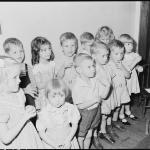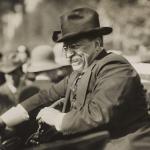Carl Trueman’s piece about the failure of evangelical elites likely misconstrued the work of George Marsden and Mark Noll (and others) by confusing the appeal of the evangelical mind with its actual accomplishment. He argues that they were trying to gain a hearing in a secular academy comprised of people skeptical or hostile to Christianity:
Noll and Marsden are careful to sustain full-blooded affirmations of orthodox Christian faith. And unlike Schleiermacher’s, I find their arguments convincing. There is nothing about belief in the saving death and bodily resurrection of Jesus Christ that undermines intellectual rigor or compromises academic standards—unless, of course, those standards are deemed above criticism from the get-go. But there can be no doubt that the extraordinarily positive reception of Noll’s and Marsden’s ideas came about because university-educated Evangelicals in the 1990s were anxious to be reassured. The universities they attended increasingly told them that their faith was disqualifying. Noll and Marsden argued otherwise, showing that a person of faith who engaged in self-criticism and discarded untenable beliefs could participate fully in modern intellectual life.
The hostility that Trueman assumes between the academy and Christian faith was as prevalent (on one level) in the 1980s and 1990s as it is today; the social justice component was not as strong then even as the odiousness of the Religious Right was almost as palpable as it is today. (No one reputable admired Jerry Falwell, the elder.) And yet evangelical scholars like Marsden and Noll gained recognition from scholars and journalists not inclined to give evangelical Protestants much time. One indication is the cover story about The Opening of the Evangelical Mind for The Atlantic written by Alan Wolfe, a Jewish American sociologist who taught at Boston College. Wolfe was clear to acknowledge evangelicalism’s less than becoming reputation:
OF all America’s religious traditions, evangelical Protestantism, at least in its twentieth-century conservative forms, ranks dead last in intellectual stature. High-church Protestants established most of those universities we now call Ivy League. Methodism, with strong evangelical roots in England, came to America, eventually lost its revivalist spirit, and produced Northwestern, Boston University, and Emory. Three Catholic universities — Georgetown, Notre Dame, and Boston College — are now ranked in the top fifty of America’s research universities. If there are only one or two great universities that are distinctively Jewish, that is because Jews have been so successful throughout American academic and intellectual life. No comparable legacy has come from those fundamentalist sects that have flourished in the American heartland.
But between the 1970s and 1990s evangelical scholars changed that perception significantly:
Because of the work of historians such as Noll, Marsden, Carpenter, and Nathan Hatch, the provost of Notre Dame, no serious student of American history can any longer dismiss evangelical Christianity as little more than a backward reaction against modernity. In particular, the Institute for the Study of American Evangelicals, at Wheaton College, currently directed by Edith Blumhofer, has sponsored scholarship exploring the contributions of evangelicals to American democracy, music, race relations, and popular culture.
At a time when humanities departments at American universities are obsessed with theory, conservative Christian scholars have kept alive a humanistic tradition of writing about poetry and fiction for the informed lay reader. That tradition is best represented a magazine modeled on With close ties to Wheaton College, Books & Culture, edited by a polymath named John Wilson, publishes articles by evangelical scholars on topics ranging from Jean Jacques Rousseau to popular film. In addition to evangelicals, figures as diverse as the economist Glenn C. Loury; the historian Eugene Genovese; Richard Bernstein, of New School University; and the novelist Larry Woiwode have written for the magazine, which has featured interviews with Stanley Crouch, Adam Michnik, and Francis Fukuyama.
This was about much more than appearance. Wolfe’s point was that evangelical scholars rose to a measure of prominence in some fields of study thanks to hard work, good research, and publications well regarded by peers in the university.
To be sure, Noll and Marsden were inspirations to junior evangelical academics who wanted to be as well regarded as those senior historians. But the main point of being an evangelical scholar in the 1990s was to do good work, contribute to a field of research, and be part of the field of study (wherever that took you).
Trueman’s point about scholars seeking respectability from Christianity’s cultured despisers has less resonance with that older set of scholars than with the ones who studied with them. Those younger (by no means young) historians now gain notoriety by overturning Noll and Marsden’s work. Instead of looking at evangelicals as part of the study of American religion, mostly notably scholars like John Fea and Kristen DuMez have turned the study of evangelicals into a means by which to prove anti-Trump bona fides. That strategy has been a success and yielded attention in the press and on podcasts.
But what will the long-term effect be on the field of American history? My sense is that it will be minimal because it is scholarship written more with headlines in mind than with actual assessment of a field of study, seeing where new lines of inquiry might need to go, recognizing neglected topics, or even reconceptualizing categories for assessing the past. Noll and Marsden were part of a greater resurgence of scholarship about religion in American universities. They were not merely seeking a place in the limelight of public opinion.












